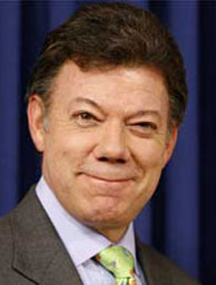CARTAGENA, Colombia, (Reuters) – Colombia’s President Juan Manuel Santos rejected accusations that leftist FARC guerrillas are making a comeback, describing recent attacks as a last-gasp effort to grab headlines that did not pose a threat to economic prosperity.

In an interview at one of his official residences, in the coastal city of Cartagena, Santos said a surge in violence by the Marxist rebels was an attempt to remain relevant as they faced attacks by government troops that eroded their capacity to fight and demoralized their ranks.
“The weaker these illegal groups are, the more they want to show that they are alive,” Santos told Reuters late on Tuesday, dressed in a T-shirt and shorts after being caught in a tropical downpour during a visit to a shantytown.
“And what do they use? Terrorism.”
Santos, at the mid-point of his four-year term, has received a constant stream of criticism on Twitter from his predecessor and former ally Alvaro Uribe over the perception that security gains during Uribe’s presidency were being reversed.
Snipes from the ex-president have intensified since Uribe pulled out of the ruling coalition this month and became the official opposition, hoping to put his own candidate in the presidential palace in 2014.
Uribe blames Santos for “squandering the inheritance” of security improvements and seeking peace with the FARC at any cost.
“Unfortunately some people want to use this violence and terrorism as a political weapon,” said Santos, who served as Uribe’s defense minister. “And, in a way, they play into the hands of the terrorists by magnifying the effect.”
He vowed to “show the country what we are doing and show that (Uribe) is wrong.”
The 60-year old Santos — who says he won’t talk about plans for re-election until next year — has seen his ratings slide in recent weeks amid allegations of corruption in Congress and complaints that rebels were gaining the upper hand against government troops after hard-fought gains over the last decade.
“Santos will remain politically vulnerable and may see a further drop in his approval ratings if the government does not show progress on improving Colombia’s security environment further,” risk consultant Eurasia Group said in a research note.
SECURITY – A “NON-ISSUE”
FOR INVESTORS
The drug-funded Revolutionary Armed Forces of Colombia, or FARC, which has battled a dozen governments during nearly five decades, has stepped up its attacks on Colombia’s economic infrastructure this year, hitting oil pipelines 67 times, more than triple the level during the same period in 2011.
“You must understand that we are starting to explore in areas that were completely off-limits. Nobody thought that was possible – in very deep jungle,” said Santos, after spending a day speaking to oil workers at state-run Ecopetrol’s Reficar refinery and visiting a near-by slum.
He admitted, however, that extortion cases had increased.
Despite the recent criticism, Santos, a Harvard-educated economist and journalist, is credited with dealing the FARC some of its heaviest blows and battle defeats.
As defense minister and then as president, he orchestrated attacks that killed or captured the group’s top commanders and helped cut their fighting force by half to about 8,000 now.
“We are gaining more and more control of territory and we are advancing,” said Santos.
“We are winning but we have not won yet.”
Speaking in the plush living room of the residence inside a military base, Santos said foreign investors have not been phased by the FARC attacks and are keen to do business with Colombia.
“Investors are now more concerned about legal insecurity than physical insecurity,” said Santos, trumpeting that 640 foreign companies have come to Colombia since he took office.
“Security, so far, is a non-issue.”
